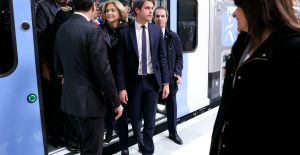Emmanuel Macron wants to change the rules. In a letter sent on Sunday to the parties, and revealed by Le Figaro, the Head of State put back on the table a subject debated at length during the first “Saint-Denis meetings”: the relaxation of the referendum, and its extension to “social issues”, such as immigration or “the end of life”.
A political initiative reminiscent of that of one of his predecessors, almost 40 years ago. In 1984, François Mitterrand tried a gamble and proposed broadening the conditions for organizing a referendum to extend it to public freedoms. The initiative is mainly designed to have the Savary bill adopted. This text, which aims to integrate private schools into “a major public service”, brings more than a million French people onto the streets, and weakens the government. Result: in the spring of 1984, the popularity rating of the head of state was at its lowest (30% satisfied), just three years after his accession to the Élysée. “The president is facing a deep social and political crisis, he must break the deadlock,” says historian Jean Garrigues, author of Happy Days (Ed. Payot).
Also read: In 1984, the mobilization was fatal to the Savary law
Until then, the bill had a chaotic parliamentary journey. After a passage in the National Assembly, where the left-wing majority toughened the text a little further, the Senate, with a right-wing majority, took up the explosive issue at the beginning of the summer. On July 5, the boss of the RPR senators, Charles Pasqua, put the executive under pressure and tabled a referendum motion to submit the Savary bill to the polls. The operation is impossible as it stands since the scope of the referendum is then limited to questions relating to the organization of public authorities. But the initiative has the merit of seriously annoying the top of the State. During a trip to Auvergne, the president criticized “mediocre policy” and assured that he would not allow himself to be “intimidated by invectives and obstructions”.
However, behind the scenes, François Mitterrand is preparing his counterattack to trap the right. From his sheepfold in Latche (Landes), where he goes every summer, the president explains his plan to his close collaborator, Michel Charasse, and to the boss of the Socialist Party, Lionel Jospin. In the coming days, he will propose a referendum on the Constitution, as desired by the RPR and its allies. But he also knows that the senatorial right, very angry against the executive, will oppose it. “It was a political maneuver. He was keen to find a way out to abort this project which he did not want,” relates his special advisor, Jacques Attali.
On July 12, without having informed his government, François Mitterrand shifted into high gear. Taking the oppositions and his own camp by surprise, he announced the holding of a “referendum on the referendum”. “I think that the time has come to initiate the constitutional revision which will allow the President of the Republic (...) to consult the French on the major questions which concern these precious inalienable goods which are public liberties, and that is the people who will decide,” he says.
Also read History of the referendum in France: a long mistrust of the leaders towards the people
None of this will ultimately happen. Disowned, the Minister of National Education, Alain Savary, renounces and leaves his functions. Prime Minister Pierre Mauroy followed suit and presented the resignation of his government. The bill is simply withdrawn, while the constitutional revision process is slipping. The “referendum on the referendum” was finally rejected on August 8 by the right and the center in the Senate, who had nevertheless demanded it. Everything goes as planned for François Mitterrand, who then takes pleasure in confronting the RPR with its contradictions and above all, making it take the blame for this failure.
“The senatorial majority did not want to give him a gift. The reform of Article 11 would certainly have been approved by the French, and this would have allowed the head of state to show that he had the support of the people,” analyzes public law professor Dominique Rousseau. A scenario that Emmanuel Macron undoubtedly keeps in the back of his mind. “Is the opposition ready to give him this gift today, a few months before the European elections?” asks the constitutionalist.

 What is chloropicrin, the chemical agent that Washington accuses Moscow of using in Ukraine?
What is chloropicrin, the chemical agent that Washington accuses Moscow of using in Ukraine? Poland, big winner of European enlargement
Poland, big winner of European enlargement In Israel, step-by-step negotiations for a ceasefire in the Gaza Strip
In Israel, step-by-step negotiations for a ceasefire in the Gaza Strip BBVA ADRs fall almost 2% on Wall Street
BBVA ADRs fall almost 2% on Wall Street Children born thanks to PMA do not have more cancers than others
Children born thanks to PMA do not have more cancers than others Breast cancer: less than one in two French women follow screening recommendations
Breast cancer: less than one in two French women follow screening recommendations “Dazzling” symptoms, 5,000 deaths per year, non-existent vaccine... What is Lassa fever, a case of which has been identified in Île-de-France?
“Dazzling” symptoms, 5,000 deaths per year, non-existent vaccine... What is Lassa fever, a case of which has been identified in Île-de-France? Sánchez cancels his agenda and considers resigning: "I need to stop and reflect"
Sánchez cancels his agenda and considers resigning: "I need to stop and reflect" “Amazon product tester”: the gendarmerie warns of this new kind of scam
“Amazon product tester”: the gendarmerie warns of this new kind of scam “Unjustified allegations”, “promotion of illicit products”… Half of the influencers controlled in 2023 caught by fraud repression
“Unjustified allegations”, “promotion of illicit products”… Half of the influencers controlled in 2023 caught by fraud repression Extension of the RER E: Gabriel Attal welcomes a “popular” ecology project
Extension of the RER E: Gabriel Attal welcomes a “popular” ecology project WeWork will close 8 of its 20 shared offices in France
WeWork will close 8 of its 20 shared offices in France “We were robbed of this dignity”: Paul Auster’s wife denounces the betrayal of a family friend
“We were robbed of this dignity”: Paul Auster’s wife denounces the betrayal of a family friend A masterclass for parents to fill in their gaps before Taylor Swift concerts
A masterclass for parents to fill in their gaps before Taylor Swift concerts Jean Reno publishes his first novel Emma on May 16
Jean Reno publishes his first novel Emma on May 16 Cannes Film Festival: Meryl Streep awarded an honorary Palme d’Or
Cannes Film Festival: Meryl Streep awarded an honorary Palme d’Or Omoda 7, another Chinese car that could be manufactured in Spain
Omoda 7, another Chinese car that could be manufactured in Spain BYD chooses CA Auto Bank as financial partner in Spain
BYD chooses CA Auto Bank as financial partner in Spain Tesla and Baidu sign key agreement to boost development of autonomous driving
Tesla and Baidu sign key agreement to boost development of autonomous driving Skoda Kodiaq 2024: a 'beast' plug-in hybrid SUV
Skoda Kodiaq 2024: a 'beast' plug-in hybrid SUV The home mortgage firm rises 3.8% in February and the average interest moderates to 3.33%
The home mortgage firm rises 3.8% in February and the average interest moderates to 3.33% This is how housing prices have changed in Spain in the last decade
This is how housing prices have changed in Spain in the last decade The home mortgage firm drops 10% in January and interest soars to 3.46%
The home mortgage firm drops 10% in January and interest soars to 3.46% The jewel of the Rocío de Nagüeles urbanization: a dream villa in Marbella
The jewel of the Rocío de Nagüeles urbanization: a dream villa in Marbella Europeans: a senior official on the National Rally list
Europeans: a senior official on the National Rally list Blockade of Sciences Po: the right denounces a “drift”, the government charges the rebels
Blockade of Sciences Po: the right denounces a “drift”, the government charges the rebels Even on a mission for NATO, the Charles-de-Gaulle remains under French control, Lecornu responds to Mélenchon
Even on a mission for NATO, the Charles-de-Gaulle remains under French control, Lecornu responds to Mélenchon “Deadly Europe”, “economic decline”, immigration… What to remember from Emmanuel Macron’s speech at the Sorbonne
“Deadly Europe”, “economic decline”, immigration… What to remember from Emmanuel Macron’s speech at the Sorbonne These French cities that will boycott the World Cup in Qatar
These French cities that will boycott the World Cup in Qatar Champions Cup: Toulouse with Flament and Kinghorn against Harlequins, Ramos replacing
Champions Cup: Toulouse with Flament and Kinghorn against Harlequins, Ramos replacing Tennis: still injured in the arm, Alcaraz withdraws from the Masters 1000 in Rome
Tennis: still injured in the arm, Alcaraz withdraws from the Masters 1000 in Rome Sailing: “Like a house that threatens to collapse”, Clarisse Crémer exhausted and in tears aboard her damaged boat
Sailing: “Like a house that threatens to collapse”, Clarisse Crémer exhausted and in tears aboard her damaged boat NBA: Patrick Beverley loses his temper and throws balls at Pacers fans
NBA: Patrick Beverley loses his temper and throws balls at Pacers fans


















